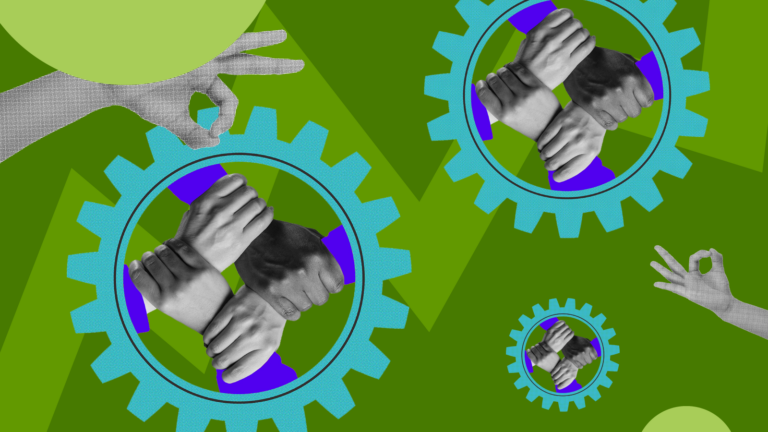
How AI in talent management is revolutionizing HR

The advent of AI in talent management is revolutionizing the way companies approach recruitment, training, and employee retention. This technological leap transcends mere efficiency gains; it significantly enhances the human aspects of human resources.
AI-driven tools are transforming recruitment by enabling more precise candidate matching, reducing biases, and streamlining the hiring process.

By analyzing vast amounts of data, AI can identify candidates with the right talent who not only possess the required skills but also align with a company’s culture and values, leading to a more effective and holistic hiring approach.
In training and development, AI offers personalized learning experiences, adapting to individual employees’ learning styles and needs. This personalization ensures that employees are more engaged and receive training that is directly relevant to their roles and career aspirations.
In this article, we are going to explore the advancements in talent management created from AI in detail. We’ll also cover:
- The evolution of AI in talent management
- AI-driven recruitment processes
- AI in employee development and training
- AI for employee engagement and retention
- Ethical considerations and challenges
- The future of AI in talent management
Let’s dive in!
The evolution of AI in talent management
The evolution of Artificial Intelligence (AI) in talent management has been a journey of continuous innovation and expansion, from its initial stages to its current advanced applications.
This progression has opened up new avenues to streamline and enhance human resource functions.
In its early stages, AI in talent management was primarily focused on automating administrative tasks, such as sorting resumes and scheduling interviews.
This initial use case provided HR professionals with more time to focus on strategic aspects of their role, rather than being bogged down by routine tasks.
As AI technology advanced, its applications in talent management became more sophisticated. One of the significant breakthroughs was the introduction of predictive analytics. This allowed HR teams to forecast future workforce trends, such as employee turnover, and to make data-driven decisions about talent acquisition and retention strategies.
AI’s role in enhancing the recruitment process has also been notable. Advanced algorithms now assist in identifying the best candidates by analyzing not just their resumes, but also their online professional profiles and even their performance in skill-based assessments.
This holistic approach to candidate evaluation ensures a more accurate of matching candidates fit for the role and the organization’s culture.
In training and development, AI has brought about personalized learning experiences. Through adaptive learning technologies, AI tailors training programs to individual employees’ learning patterns, making professional development more efficient and effective.
More recently, AI has begun to play a crucial role in employee engagement and well-being. AI-powered tools can analyze employee feedback in real-time, providing insights into team morale and helping identify areas for improvement in the work environment.
AI-driven recruitment processes
AI technologies, including automated screening and advanced candidate assessments, are significantly reshaping the recruitment landscape, driving greater efficiency and effectiveness in the process.
Automated screening, powered by AI, revolutionizes the initial stages of recruitment.
It efficiently sorts through large volumes of applications, quickly identifying candidates who meet the specified criteria.
This automation reduces the time and effort traditionally required in manual screening, allowing HR professionals to focus on more nuanced aspects of the recruitment process.
Advanced candidate assessments, another facet of AI in recruitment, go beyond traditional evaluations.
They employ sophisticated algorithms to analyze a candidate’s skills, personality traits, and even potential cultural fit with the organization.

These AI-driven approaches not only streamline the recruitment process but also enhance its accuracy.
By minimizing human biases and relying on data-driven insights, AI technologies ensure a fairer, more objective candidate selection.
This shift towards AI-enhanced recruitment represents a significant step forward in how organizations attract and secure top talent.
Redefining talent management through technology
AI is not merely automating tasks; it’s fundamentally changing how companies approach talent management. AI algorithms can analyze employee data to identify patterns and predict future outcomes, allowing businesses to make proactive decisions. For example, AI can help predict which employees might be considering leaving the company, enabling HR to intervene and address potential issues before they escalate. This predictive capability of AI empowers organizations to move from a reactive to a proactive approach, creating a more engaging and fulfilling employee experience.
Transforming the talent lifecycle with AI
Artificial Intelligence is no longer a futuristic concept. It’s rapidly changing the present, particularly the way we work and manage talent. AI in talent management is revolutionizing traditional HR processes, making them more efficient and effective. But how exactly is AI transforming the talent lifecycle? Let’s dive into the details.
AI in employee development and training
AI-driven platforms are revolutionizing the landscape of employee development by personalizing learning paths and analyzing employee performance and metrics, thereby playing a pivotal role in aiding employees’ growth in their roles and careers.
These platforms utilize AI algorithms to tailor learning experiences to individual needs and preferences.
By analyzing an employee’s past learning behavior, performance data, and career aspirations, the AI can recommend specific courses, materials, and learning activities that are most relevant and beneficial to their professional development.
This personalized approach ensures that employees are more engaged with their learning, leading to more effective skill development and knowledge acquisition.
In addition to personalization, AI-driven platforms offer sophisticated performance analysis.
They can track an employee’s progress through various learning modules, providing insights into areas of strength and those needing improvement.
This data-driven feedback allows employees to focus their efforts more effectively and helps managers in guiding their team’s development.
AI for employee engagement and retention
AI tools are increasingly being utilized to devise innovative employee engagement strategies and to predict turnover, thereby aiding organizations in developing more effective retention policies.
These AI-driven tools analyze various data points, including employee feedback, work patterns, and engagement levels, to identify trends and potential areas of concern.
This analysis enables organizations to tailor engagement strategies that are not only innovative but also highly targeted to the specific needs and preferences of their workforce.
In predicting employee turnover, AI tools use advanced algorithms to analyze patterns and signals that may indicate a higher risk of an employee leaving.

This predictive capability allows organizations to proactively address potential issues before they lead to turnover.
By understanding the factors that contribute to employee dissatisfaction or disengagement, HR teams can implement targeted interventions to improve employee satisfaction and loyalty.
The use of AI in these areas represents a shift towards a more data-driven approach in managing employee engagement and retention.
By leveraging the insights provided by AI, organizations can create a more positive and supportive work environment, ultimately leading to better retention rates and a more stable, engaged workforce.
AI-driven innovations in talent acquisition and retention
AI in talent management is revolutionizing how companies find, attract, and retain top talent. This shift is driven by the need for faster, more efficient, and less biased hiring processes. Let’s explore some groundbreaking applications of AI, particularly in talent acquisition and retention.
Sophisticated candidate matching algorithms
Remember struggling to find candidates whose skills truly matched the job requirements? Sifting through countless resumes was time-consuming and often ineffective. However, AI is changing the talent acquisition landscape by employing sophisticated algorithms to streamline the process. These algorithms excel at analyzing vast amounts of data, such as resumes and online profiles, to identify the best candidates based on skills, experience, and cultural fit. This targeted approach saves recruiters significant time and effort, allowing them to focus on building relationships with potential hires.
Automated applicant assessments and interviews
Think about the traditional hiring process. It often involved multiple interview rounds and assessments, consuming valuable time for both candidates and hiring managers. However, imagine a scenario where AI streamlines this entire process. AI-powered platforms can now automate assessments, evaluating candidates’ technical skills, problem-solving abilities, and even soft skills through chatbots or pre-recorded video interviews. This automation not only speeds up the hiring process but also helps eliminate unconscious bias, leading to more objective and fair talent acquisition decisions.
For instance, DevSkiller TalentScore empowers organizations with real-world technical assessments focusing on actual technical skills through real-world programming assignments. It offers over 5,000 tasks, including Cloud, Cybersecurity, and Data Science features. It includes cutting-edge analytics, a real-world testing environment, and a custom task builder.
Predictive analytics for employee turnover
Employee turnover is a major concern for companies across all industries. The costs associated with replacing experienced employees can be substantial. However, what if we could predict which employees might be considering leaving and address their concerns proactively? That’s where the power of predictive analytics comes in.
AI algorithms can now analyze various data points, such as employee performance reviews, salary information, and even employee sentiment gathered from emails or internal communication platforms, to identify patterns and predict employee turnover. For example, imagine an algorithm detecting that employees who haven’t received a promotion within a specific timeframe are more likely to leave. This allows companies to intervene early, offer professional development opportunities, or address potential concerns before they escalate, ultimately fostering a more engaging and rewarding work environment.
Furthermore, consider these compelling statistics. A recent study revealed that “62% of talent acquisition professionals say they are optimistic about AI’s impact on recruitment, yet only 27% of talent professionals say that they’re using or experimenting with generative AI.” This suggests significant potential for wider AI adoption in talent management. The same study also found that “57% of talent professionals say generative AI makes it faster/easier to write job descriptions,” highlighting how AI can streamline even the most fundamental aspects of recruitment.
Ethical considerations and challenges
The integration of AI in the talent management processes indeed brings to the fore critical concerns regarding bias, fairness, and privacy, which require careful consideration and management.
Bias in AI algorithms is a significant concern, as these systems often learn from historical data, which may contain inherent biases.
This could lead to unfair or discriminatory practices in recruitment, promotion, or employee development decisions. To mitigate this risk, it is essential to ensure that AI systems are trained on diverse and inclusive data sets and regularly audited for any biases.
Fairness is closely linked to bias and pertains to the equitable treatment of all employees.
AI systems in talent management should be transparent in their decision-making processes, allowing HR professionals to understand and justify the outcomes.
Regular checks and balances are necessary to ensure that AI-driven decisions do not disadvantage any group of employees.
Privacy concerns arise from the vast amounts of personal and professional data AI systems handle.
Ensuring the confidentiality and security of this data is paramount. Organizations must adhere to data protection laws and regulations and should be transparent with employees about how their data is being used and safeguarded.
Addressing these concerns is not only a legal and ethical imperative but also crucial for maintaining trust and credibility in AI-driven talent management practices. Organizations must adopt a proactive approach, continuously monitoring and updating their AI systems to ensure they remain fair, unbiased, and respectful of privacy.
The future of AI in talent management
The future of AI in talent management holds a myriad of promising innovations and trends, poised to further and revolutionize talent management practices in this field.
One significant trend is the advancement of natural language processing (NLP). This technology will enable more sophisticated analysis of employee feedback, performance reviews, and even informal communications, providing deeper insights into employee sentiment and engagement levels.
Another emerging trend is the use of AI for workforce planning and predictive analytics. AI systems will become more adept at forecasting future talent needs, identifying potential skill gaps, and suggesting strategies for workforce development and succession planning.

Additionally, the integration of emotional AI, which is human intelligence and can interpret and respond to human emotions, is expected to enhance employee support and wellness programs. This technology could offer more personalized support and improve mental health and well-being in the workplace.
AI is also likely to become more embedded in day-to-day HR tasks, automating routine activities and providing HR professionals with more time to focus on strategic initiatives.
This integration will lead to more efficient HR operations and improved employee experiences.
The future of AI in talent management is not just about technological advancements but also about creating a more engaging, supportive, and productive workplace. As AI continues to evolve, it will undoubtedly unlock new potential in managing and nurturing talent in organizations.
結論
AI in talent management is indeed a game-changer, offering immense benefits while also introducing new challenges.
Its role in transforming human resources is substantial and holds a bright future.
The benefits of AI in talent management are diverse. It streamlines recruitment processes, enhances employee training and development, and improves decision-making through data-driven insights.
AI’s ability to predict employee turnover and identify areas for improving engagement and satisfaction is invaluable for shaping a positive and productive workplace culture.
However, the integration of AI also presents challenges. Addressing concerns around bias, ensuring fairness in AI-driven decisions, and maintaining employee privacy are paramount.
As AI systems become more ingrained in HR processes, it’s crucial to manage these challenges proactively.
Looking ahead, AI’s role in human resources is set to expand, with technologies becoming more sophisticated and capable.
This progression promises to not only enhance the efficiency of HR functions but also to enrich the overall employee experience. The future of AI in talent management is poised to be a transformative force, reshaping the landscape of human resources in innovative ways.
よくあるご質問
How does AI improve recruitment processes?
AI enhances recruitment by automating mundane tasks, improving candidate screening, and offering data-driven insights for better decision-making.
Can AI in talent management lead to biases?
Yes, if not carefully managed, AI can perpetuate existing biases. It’s crucial to design AI systems that are fair and unbiased.
What are the ethical concerns surrounding AI in talent acquisition teams and management?
Ethical concerns include issues of privacy, data security, human interaction, and the potential for AI to make decisions that affect employee welfare.
How does AI contribute to employee training and development?
AI personalizes learning experiences and provides analytics to guide employees’ career development effectively.
What is the future of AI in talent management?
The future includes more advanced predictive analytics, personalized employee experiences, and enhanced decision-making capabilities.




